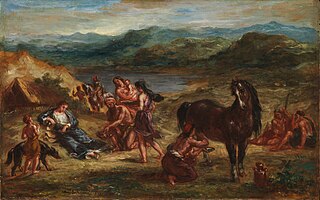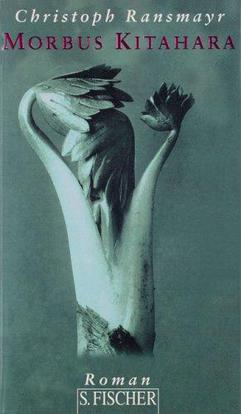
In Greek mythology, Daedalus was a skillful architect and craftsman, seen as a symbol of wisdom, knowledge and power. He is the father of Icarus, the uncle of Perdix, and possibly also the father of Iapyx. Among his most famous creations are the wooden cow for Pasiphaë, the Labyrinth for King Minos of Crete which imprisoned the Minotaur, and wings that he and his son Icarus used to attempt to escape Crete. It was during this escape that Icarus did not heed his father's warnings and flew too close to the sun; the wax holding his wings together melted and Icarus fell to his death.

Publius Ovidius Naso, known in English as Ovid, was a Roman poet who lived during the reign of Augustus. He was a younger contemporary of Virgil and Horace, with whom he is often ranked as one of the three canonical poets of Latin literature. The Imperial scholar Quintilian considered him the last of the Latin love elegists. Although Ovid enjoyed enormous popularity during his lifetime, the emperor Augustus exiled him to Tomis, the capital of the newly-organised province of Moesia, on the Black Sea, where he remained for the last nine or ten years of his life. Ovid himself attributed his banishment to a "poem and a mistake", but his reluctance to disclose specifics has resulted in much speculation among scholars.
In Greek mythology, Coeus, also called Polus, was one of the Titans, one of the three groups of children born to Uranus (Sky) and Gaia (Earth).

Myrrha, also known as Smyrna, is the mother of Adonis in Greek mythology. She was transformed into a myrrh tree after having intercourse with her father, and gave birth to Adonis in tree form. Although the tale of Adonis has Semitic roots, it is uncertain where the myth of Myrrha emerged from, though it was probably from Cyprus.

Karl Wilhelm FriedrichSchlegel was a German poet, literary critic, philosopher, philologist, and Indologist. With his older brother, August Wilhelm Schlegel, he was one of the main figures of Jena Romanticism.

Clytie or Clytia is a water nymph, daughter of the Titans Oceanus and Tethys in Greek mythology. She is thus one of the 3,000 Oceanid nymphs, and sister to the 3,000 Potamoi.
John Edwin Woods was an American translator who specialized in translating German literature, since about 1978. His work includes much of the fictional prose of Arno Schmidt and the works of contemporary authors such as Ingo Schulze and Christoph Ransmayr. He also translated all the major novels of Thomas Mann, as well as works by many other German writers.
Michael Hofmann is a German-born poet, translator, and critic. The Guardian has described him as "arguably the world's most influential translator of German into English".

In Greek and Roman mythology, Corone is a young woman who attracted the attention of Poseidon, the god of the sea, and was saved by Athena, the goddess of wisdom. She was a princess and the daughter of Coronaeus. Her brief tale is recounted in the narrative poem Metamorphoses by the Roman poet Ovid. Several other myths surround the crow about its connection to Athena.

Metamorphoses is a play by the American playwright and director Mary Zimmerman, adapted from the classic Ovid poem Metamorphoses. The play premiered in 1996 as Six Myths at Northwestern University and later the Lookingglass Theatre Company in Chicago. The play opened off-Broadway in October 2001 at the Second Stage Theatre. It transferred to Broadway on 21 February 2002 at the Circle in the Square Theatre produced by Roy Gabay and Robyn Goodman. That year it won several Tony Awards.

Christoph Ransmayr is an Austrian writer.

Acis and Galatea are characters from Greek mythology later associated together in Ovid's Metamorphoses. The episode tells of the love between the mortal Acis and the Nereid (sea-nymph) Galatea; when the jealous Cyclops Polyphemus kills Acis, Galatea transforms her lover into an immortal river spirit. The episode was made the subject of poems, operas, paintings, and statues in the Renaissance and after.

Ovid, the Latin poet of the Roman Empire, was banished in 8 AD from Rome to Tomis by decree of the emperor Augustus. The reasons for his banishment are uncertain. Ovid's exile is related by the poet himself, and also in brief references to the event by Pliny the Elder and Statius. At the time, Tomis was a remote town on the edge of the civilized world; it was loosely under the authority of the Kingdom of Thrace, and was superficially Hellenized. According to Ovid, none of its citizens spoke Latin, which as an educated Roman, he found trying. Ovid wrote that the cause of his exile was carmen et error, probably the Ars Amatoria and a personal indiscretion or mistake. The council of the city of Rome revoked his exile in December 2017, 2,009 years after his banishment.
Metamorphoses (Transformations) is a Latin narrative poem by the Roman poet Ovid, considered his magnum opus. Comprising fifteen books and over 250 myths, the poem chronicles the history of the world from its creation to the deification of Julius Caesar within a loose mythico-historical framework. Although meeting the criteria for an epic, the poem defies simple genre classification by its use of varying themes and tones.

Jamie Bulloch is a British historian and translator of German literature, with over fifty published titles to his name, and twice winner of the Schlegel-Tieck prize.
The Schlegel-Tieck Prize for German Translation is a literary translation award given by the Society of Authors in London. Translations from the German original into English are considered for the prize. The value of the prize is £3,000, while the runner-up now receives £1,000. The prize is named for August Wilhelm Schlegel and Ludwig Tieck, who translated Shakespeare to German in the 19th century.

Atlas of an Anxious Man is a 2012 book by the Austrian writer Christoph Ransmayr. It consists of 70 texts with impressions from different places in the world, each beginning with the words "I saw".

The Terrors of Ice and Darkness is a 1984 novel by the Austrian writer Christoph Ransmayr. It tells the stories of the 1872–74 Austro-Hungarian North Pole expedition, of a young Italian man who disappeared in 1981 while researching the expedition, and of the narrator, who tries to figure out what happened to the Italian.

The Dog King is a 1995 novel by the Austrian writer Christoph Ransmayr. Its original title is Morbus Kitahara. A work of alternative history, it is set in Central Europe after World War II and the implementation of the Morgenthau Plan, which has deindustrialized the region and created a ruthless post-apocalyptic-esque society. The main character is the son of a blacksmith who becomes the bodyguard of the only man in the area who owns a car.

In ancient Greece, the surviving Greek mythology features a wide collection of myths where the subjects are physically transformed, usually through either divine intervention or sorcery and spells. Similar themes of physical transformation are found in all types of mythologies, folklore, and visual arts around the world, including those of Mesopotamian, Roman, medieval, and ancient Chinese.















